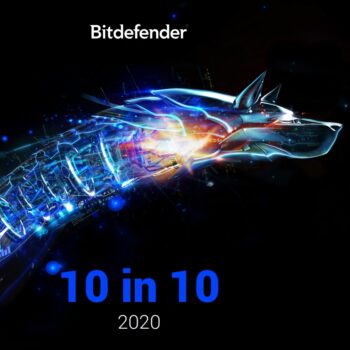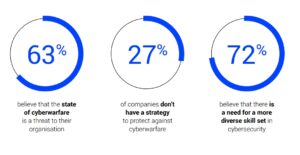
Many IT security managers do not see themselves well prepared for future attacks and believe their companies can be blackmailed. Bitdefender study “10 in 10” on IT security recommends: Address the skills gap with more diversity.
Seven out of ten (71%) IT security officers in top management believe that cyberwar activities put their organization at risk. Half (49%) worry that a ransomware attack could wipe out their business, and six in ten (59%) believe that their company might make payments to blackmailers. To better arm themselves, three quarters (76%) recommend more diversity among IT security professionals. This is one of the key findings of a large global study Bitdefender published today.

Important findings from the large study "10 in 10" - ten factors that will determine the success of IT security in the next ten years (Bitdefender).
The study “10 in 10” examined the question of which ten factors will determine the success of IT security in the next ten years. A total of 6.700 IT security experts in ten countries were surveyed, over 500 of them in Germany. The respondents work in companies with over 100 employees. 23% of the respondents belong to top management (“C-Level”). The full report is available free of charge. The most important results summarized:
Cyberwar: a real threat that many are unprepared for
Seven in ten of the top managers surveyed (71%) believe that cyberwarfare is a threat to their organization. At the same time, just over a fifth (22%) admit that they have no strategy to contain this risk. Half of all respondents (50%) agree that increased cyberwar activity will hurt the economy in the next 12 months.
Ransomware: A booming business model that can wipe out companies
43% of IT security professionals reported seeing an increase in ransom attacks in the wake of the pandemic. 63% expect a further increase in the next 12 to 18 months. 49% of top executives fear that a ransomware attack could wipe out their business in the next 12 to 18 months if they don't increase their investment in security. And even 59% of them believe their company would make a payment to keep information from being published.
Communication: Creating greater understanding to attract investment
Half (51%) of all respondents agree that the way they communicate about cybersecurity needs to change dramatically in order for the necessary investments to be made in this area. Two-fifths (41%) believe that more communication with the wider public and customers is needed in the future so that everyone, both inside and outside the organization, better understands the risks. 38% demand better communication with management so that they understand the risks. 39% want less technical language so their entire organization understands the dangers and learns how to protect themselves.
Diversity: More diversity to make companies more robust

Liviu Arsene, Global Cybersecurity Researcher at Bitdefender, presents the new cybersecurity study “10 in 10”.
Over a quarter (28%) of the top managers surveyed predict that companies will be ruined if the current shortage of IT security professionals continues for another five years. 52% of all respondents say the lack of diversity in cybersecurity is a cause for concern. 40% of top managers claim that the cybersecurity industry must reflect the society around them. In addition, 76% believe that IT security professionals need more diverse skills. 39% of all respondents say that neurodiversity will strengthen cybersecurity, i.e. greater involvement of people on the autism spectrum or with dyslexia, dyspraxia, ADHD and other neurological peculiarities.
Liviu Arsene, Global Cybersecurity Researcher at Bitdefender, concludes: “2020 was a year of change - also for the security industry. The security landscape is evolving rapidly, trying to adapt to the new normal, from dispersed workforces to new threats. To survive in this new security landscape, we need to start thinking about how we can fill the skills gap in other ways - we need to focus on diversity, especially neurodiversity. "
No emergency plan for Corona
Bitdefender had already published a partial evaluation of data on the influence of the Corona crisis on IT security in June. Findings here included that an overwhelming majority believe the pandemic will permanently change the way their businesses operate. Half slipped into the pandemic situation without a suitable emergency plan.
Background to the “10 in 10” study
In May of this year, 10 cybersecurity and IT employees in Great Britain, the USA, Australia, New Zealand, Germany, France, Italy, Spain, Denmark and Sweden were surveyed by the market research institute Sapio Research for the “10 in 6.724” study. The report represents a broad cross-section of organizations and industries, from young SMEs with 100 or more employees to listed companies with more than 10.000 employees in a variety of industries, including finance, administration and energy. All participants in the study use data security solutions and software security products or have decision-making power about them. 23 percent of the participants belong to top management, for example CISOs, CSOs and CIOs.
Directly to the PDF of the study at Bitdefender.com
About Bitdefender Bitdefender is a leading global provider of cybersecurity solutions and antivirus software, protecting over 500 million systems in more than 150 countries. Since it was founded in 2001, the company's innovations have consistently ensured excellent security products and intelligent protection for devices, networks and cloud services for private customers and companies. As the supplier of choice, Bitdefender technology is found in 38 percent of security solutions deployed around the world and is trusted and recognized by industry experts, manufacturers and customers alike. www.bitdefender.de
